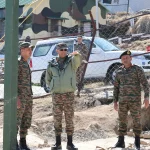In a significant escalation of Indo-Pak hostilities, recent precision airstrikes carried out by the Indian Air Force have reportedly forced Pakistan Army Chief General Asim Munir to take shelter in a military bunker for several hours. The strikes targeted the Noor Khan Air Base in Rawalpindi — a key military installation situated near Pakistan’s military headquarters — marking one of the most direct and high-stakes engagements in recent times.
These strikes were part of “Operation Sindoor,” India’s strategic response to the deadly April 22 terrorist attack in Pahalgam, Jammu and Kashmir, which claimed the lives of 26 civilians. Indian officials have attributed the attack to Pakistan-backed terror groups operating from across the border, prompting a swift and robust military reaction.
According to defense sources, the Indian Air Force deployed a combination of precision-guided munitions, including the supersonic BrahMos missile, French-origin HAMMER bombs, and long-range SCALP cruise missiles. These weapons reportedly struck critical components of Pakistan’s air defense system at eleven air bases, significantly impairing radar, communications, and command infrastructure. The intensity and precision of the strike reportedly created enough concern for General Munir to retreat to a fortified underground shelter, underscoring the psychological and strategic impact of the operation.
Compounding the situation is the political controversy surrounding Gen. Munir’s tenure. Initially set to retire in November 2025, his term was recently extended by three years — a move that has sparked criticism domestically and raised questions about military autonomy and succession within Pakistan’s power structure.
The latest escalation has drawn global attention, with world leaders urging restraint and dialogue. Analysts warn that the region’s security environment is on a knife’s edge, with both countries possessing nuclear capabilities. The Indian government has maintained that its actions were measured, targeting only military infrastructure linked to terror operations, while Pakistani officials have yet to issue a detailed public response.
As diplomatic backchannels open and ceasefire talks are floated by global mediators, the success and assertiveness of Operation Sindoor have established a new strategic precedent. India’s message — swift retaliation with technological precision — now sets the tone for future deterrence in a volatile neighborhood.













